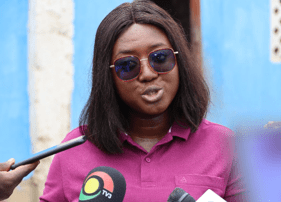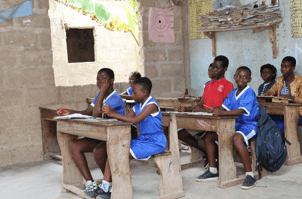By: Buertey Francis BORYOR
Education is a cornerstone for national development, yet many schools- particularly low-fee private institutions- face significant challenges in infrastructure, funding, and quality of education.
In Ghana, where access to quality education remains a concern for many communities, financial and technical support for schools is crucial.
Opportunity International is addressing these challenges through its EduFinance initiative, which provides school improvement loans and training programs to enhance learning environments and expand educational opportunities.
As part of efforts to showcase the impact of its work, the Nonprofit Organisation (NGO), organised the “Opportunity EduFinance Media Field Trip”, taking journalists to some of the beneficiary schools under the EduQuality programme in Kasoa.
The visit provided firsthand insight into the challenges these institutions face, and how the NGO is helping overcome them.

According to Lordina Omanhene-Gyimah, Senior Education Specialist- Opportunity International EduFinance, the NGO supports over 420 schools in the country, at places such as Kumasi, Obuasi, Koforidua, and Greater Accra.
“The EduQuality approach includes training school owners, teachers, and administrators- guiding them in developing school improvement plans, and offering financial assistance to enhance school infrastructure.
“The goal is to create a sustainable model where schools can systematically track progress and implement necessary changes,” she added.

Beginners Springboard Educational Centre
One such school striving to improve under challenging conditions is Beginners Springboard Educational Centre in Kasoa, located on Obom Road.
The school is a recent addition to the EduQuality programme, having completed an introductory seminar. It serves students from creche to junior high school.
Headmistress Grace Frimpomaa Boahen. outlined the school’s key struggles. “One of our biggest challenges is irregular student attendance, especially on rainy days and Fridays. And despite our low daily fees of GH₵ 9, some parents still find it difficult to pay, which affects our operations,” she explained.
Beginners Springboard follows a daily payment model covering fees, lunch, and extra classes, but student absences lead to financial instability.

Another pressing issue she highlighted was the lack of a proper school building. “We are working towards improving our infrastructure, but progress is slow. Support from Opportunity International in constructing a permanent facility would be a great relief,” Boahen added.
Currently, teaching and learning take place in unfinished, overcrowded classrooms- creating a difficult learning environment.

Supreme Care Education Centre
Just a short distance away, another school in Kasoa- Supreme Care Education Centre- offers a glimpse into what consistent support and determination can achieve over time.
Supreme Care has been part of the EduQuality programme for three years. Established in 2009, the school runs from creche to junior high school and currently enrols 400 students. Initially operating from the proprietor’s home, the school needed expansion to accommodate more students.
With funding from Opportunity International, Supreme Care was able to construct a new annex. Its proprietor Ransford Gyekye shared the school’s journey: “We started with 30 children because we saw an educational need in this community. Today, our former students include nurses and other professionals.”
However, financial challenges persist. “Loan repayment terms are a challenge. Interest rates are high, and the three-year repayment period is too short. We had hoped for a five-year term, but the maximum offered was 36 months, which strains our finances,” Gyekye explained.
Gyekye highlighted student retention as another concern. “We initially had 600 students, but now we are down to 400 because many parents move their children to public schools for free education,” he said.
While the government’s policy eases financial burdens for families, it affects the sustainability of private schools like Supreme Care.

Way of Peace Montessori Academy
While some schools are steadily expanding, others are just beginning their journey with the EduQuality programme. Way of Peace Montessori Academy, also based in Kasoa, is one such institution navigating the unique hurdles of early childhood education in underserved communities.
The institution is run by Mr. Oluwafemi Akindele, who also serves as the senior pastor of Royal Priests International Christian Centre.
Akindele highlighted the unique challenges the school faces, particularly in a community where early childhood education is not widely valued. “Many parents here do not believe in starting their children’s education early. We have to do a lot of persuasion, educating them on the importance of formative learning,” he explained.
Another significant challenge is limited space. “We have many parents who want to enrol their children in our primary section, but we simply do not have enough room. We do not want to overcrowd classrooms, so we have to turn some away,” he said.
He added that, financial difficulties also impact the school’s ability to grow. While Way of Peace has not yet accessed funding from Opportunity International, Akendele expressed interest in doing so in the future.
“The capacity-building sessions have been very beneficial, and we hope to explore financial assistance as we continue to expand,” he stated.
Despite these challenges, the school remains committed to its vision, using publicity campaigns to raise awareness about its affordability and quality.
“We tell parents that money should not be a barrier. If their children don not have uniforms, that should not stop them from attending. As we move forward, things will fall into place,” he assured.

Bright Future International School
In the Gomoa East District, Bright Future International School presents yet another perspective- a story of resilience powered by a self-reliant leader, determined to make a difference despite overwhelming odds.
The school has been part of the EduQuality programme for two years. It is run single-handedly by Mr. Lawrence Dameh Agblo, who serves as the proprietor, teacher, administrator, and even security personnel.
One of the school’s most pressing challenges is flooding. “Whenever it rains, the school compound gets flooded, and we have to physically carry the children across a makeshift wooden bridge at the entrance. Many students simply stay home when it rains,” Agblo lamented.
Despite starting with just six students, the school has grown to over 204 pupils. However, retaining students remains a major issue.
“When they reach Junior High School Form 2, the entire class often transfers to government schools due to the benefits of the free education policy. Even children in kindergarten are leaving,” he said.
Agblo called for greater government support, including deploying trained teachers to private schools, as promised by the new government. “We hope that free education policies will extend to private schools so we can better serve the community,” he added.
Despite financial struggles, Bright Future has achieved academic success. “Our recent Basic Education Certificate Examination (BECE) results were outstanding- 10 students scored between aggregate 8 and 16, with eight gaining admission to top Category-A schools in Ghana,” Agblo proudly shared.
The school charges GH₵ 200 per term, excluding feeding fees. However, payment delays from parents are common. “About 10 percent of our students owe feeding fees, but we try to work out flexible payment plans for them,” Agblo noted.
While Opportunity International has not yet provided financial assistance to the school, Agblo praised its support through training, digital learning tools, and other resources.
“Before joining Opportunity, we had about 90 students. Now we have more than 200- almost a 100 percent improvement,” he said.
Looking ahead, he hopes for further support, including lower interest rates on loans and additional classrooms to accommodate the growing student population.
Each of these schools paints a vivid picture of the challenges and aspirations within the country’s low-fee private education sector.

The Broader Impact of Opportunity International
Beyond financial assistance, Opportunity International’s EduFinance programme provides training in school management, marketing, budgeting, child protection, and teacher development.
Omanhene-Gyimah emphasised that, the NGO’s EduFinance approach extends beyond loans. “We equip school leaders with skills in financial management, branding, and child protection to help them attract and retain students while maintaining quality education.”
She also detailed the financial support available. “Our school improvement loans require schools to demonstrate their need for funding. Additionally, we offer monetary awards through the EduQuality programme for schools that successfully implement their development plans.” Schools can receive up to $1,000 to address urgent needs.
Despite these interventions, challenges remain. Many schools require more affordable financing options, longer repayment periods, and increased infrastructure support to sustain their growth.

The Opportunity EduFinance Media Field Trip highlighted the realities facing low-fee private schools in Ghana. Institutions like Beginners Springboard Educational Centre and Supreme Care Education Centre are making strides but still require substantial support to overcome their challenges. Through training, financial aid, and capacity building, Opportunity International is bridging the gap to ensure more children receive quality education in suitable learning environments.
As the country works towards improving education access and quality, initiatives like EduQuality play a crucial role. However, greater collaboration among financial institutions, government bodies, and private organisations is needed to establish sustainable solutions for long-term improvements in its education sector.








